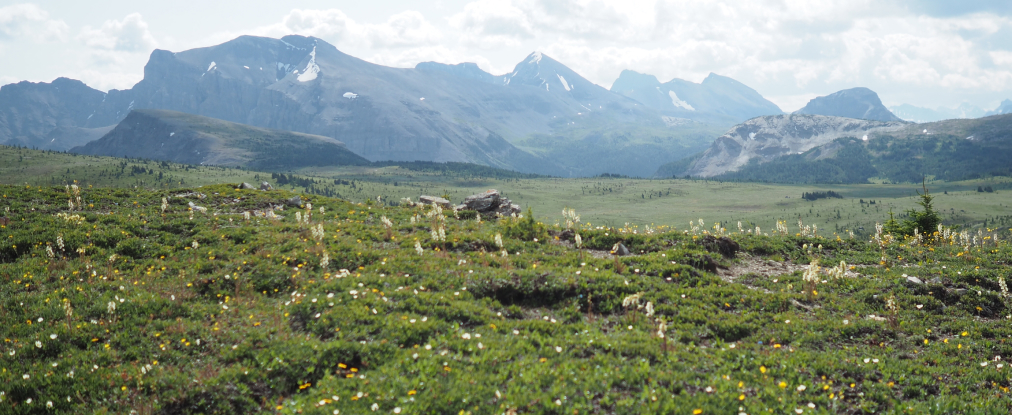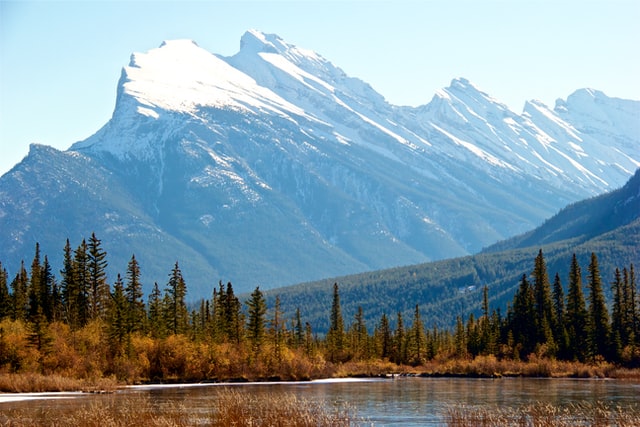The Program of Applied Research on Climate Action in Canada

Introduction
In Canada and around the world, we are already experiencing the impacts of climate change: hotter summers, more intense storms, more frequent floods, and a reduction in biodiversity. The science is clear: the Earth is warming, global and local climates are changing, and human activities are the primary cause. To avoid a dangerous level of warming, Canada is committed to cutting our greenhouse gas (GHG) emissions by 40-45% by 2030 and reaching net-zero emissions by 2050.
The 2030 Emissions Reduction Plan: Canada’s Next Steps for Clean Air and a Strong Economy is a roadmap for how Canada will achieve its 2030 target, building on the actions outlined in previous climate plans. It is the first of many plans and progress reports on the pathway to 2050 and fulfills a requirement under the Canadian Net-Zero Emissions Accountability Act.

Program of Research Overview
In September 2021, in partnership with Environment and Climate Change Canada (ECCC) and Natural Resources Canada (NRCan), the Impact and Innovation Unit launched a multi-year program of research on climate change. The Program of Applied Research on Climate Action in Canada (PARCA Canada) will apply behavioural science (BeSci) insights and methods with robust policy analysis to promote climate action.
Together with ECCC and NRCan, we will learn about how Canadians think, feel and act in response to climate change and the risks it creates. We will then develop and test, online and in the real world, specific behaviourally-informed solutions with the potential to reduce GHG emissions and promote climate adaptation at the individual and community level. This work will generate new insights on a rapid timeframe and use them to inform policy development, program design, and public communications.
A large network of internal and external partners, including partners at multilateral organizations and an advisory committee of subject matter experts, will guide the research program to help ensure its relevance, rigour, and impact.

Program of Research Activities
Scoping and longitudinal
data collection
In the scoping phase, we will first examine areas with real potential for improving climate and environmental outcomes using behavioural science-based methods and reviewing relevant scientific literature. Key outcomes will relate to transportation, home energy use, waste management, engagement with nature, preparedness for extreme weather, and disaster recovery.
In parallel, we will implement a longitudinal study (public opinion research) with a large and nationally representative sample of Canadians to gather data and track changes over time. The robust, quantitative evidence generated by this study will help identify where there is potential for promoting greater individual climate and environmental action.
Rapid online studies
and experiments
Evidence and insights from the scoping and longitudinal data collection will inform a series of rapid online studies and experiments to assess factors that can enable or prevent behaviour change.
Each online experiment will be set up as a randomized controlled trial (RCT) to isolate each experimental condition’s impact. As the gold standard in experimentation, RCTs are the best way of determining whether a strategy is working or which strategy would work best.
In-field testing
and research
We will test the research findings using in-field studies in the everyday spaces where people live, work, and play. This step is crucial for understanding whether solutions that positively influence our intentions can lead to real changes in behaviour.
Solutions will be pilot-tested on a small scale prior to being tested in larger-scale experimental or quasi-experimental studies.
Research Summaries
The following timeline provides an overview of the activities that have been carried out to date.

February 23 – March 12, 2023
Longitudinal Study:
Wave 8
The PARCA longitudinal study has measured and tracked changes over time in how Canadians think, feel, and act in response to climate change and its impacts. The eighth and final wave of part 1 of this longitudinal study recruited a new nationally representative sample of Canadians to investigate a variety of emerging topical areas in response to the evolving needs of Government and partner departments.
Learn more
November 29 to December 23, 2022
Longitudinal Study:
Wave 7
The multi-wave design of the PARCA longitudinal study enables the analysis of changes or stability in key beliefs, attitudes, and behaviours over time. Wave 7 represents one full year of data collection (Dec 2021 to Dec 2022) and enables clear year-over-year comparisons to the equivalent sample in Wave 1 (Dec 2021).
Learn more
October 14 – November 9, 2022
Longitudinal Study:
Wave 6
Canadians consistently underestimate the prevalence of pro-climate attitudes nationally. There is also a persistent disparity between Canadians' high willingness to take pro-climate action, on one hand, and their lower perceptions of social norms and the potential impact of their actions, on the other. In combination, these patterns may discourage climate actions and the voicing of pro-climate views that are incorrectly thought to be outside the norm.
Learn more
August 16 – September 6, 2022
Longitudinal Study:
Wave 5
In general, attention paid to climate change has increased slightly over the last few months. But there is a persistent disparity between Canadians' high willingness to take pro-climate action, on one hand, and their lower perceptions of social norms and the potential impact of their actions, on the other.
Learn more
June 20 – July 7, 2022
Longitudinal Study:
Wave 4
In general, attention paid to climate change and willingness to act are no longer declining. New results show that follow-through on high-impact actions is very low, suggesting a large intention-action gap related to systemic and structural barriers.
Learn more
April 25 – May 16, 2022
Longitudinal Study:
Wave 3
In general, there has been a trend towards less attention paid to climate change and less willingness to act, with most indicators decreasing slightly.
Learn more
February 17 – March 8, 2022
Longitudinal Study:
Wave 2
In general, there has been a trend of somewhat less attention being paid to climate change; most indicators have decreased slightly since Wave 1.
Learn more
December 13, 2021 – January 6, 2022
Longitudinal Study:
Wave 1
The baseline level of Canadians' knowledge, attitudes and behaviours related to climate change.
Learn moreAdvisory Committee

Dr. Joe Árvai
University of Southern California, Dornsife - Department of Psychology
-
Full bio
Dr. Joe Árvai is the Director of the Wrigley Institute for Environmental Studies and the Dana and David Dornsife Professor of Psychology at the University of Southern California. He began his career as an oceanographer but quickly pivoted to conduct research on how people formulate their attitudes and beliefs—and how they ultimately make decisions—about environmental issues such as climate change. His current research unfolds on two fronts: First, Joe and his research team conduct research aimed at improving our understanding of how people instinctively—and often in a biased fashion—approach judgment and decision-making in situations where environmental, social, and economic priorities intersect. Second, Joe and his team develop and test critical reasoning and decision-support tools aimed at helping policy-makers, business leaders, and consumers to make better, science-based judgments and choices. In light of current events, a large fraction of the current research carried out by Joe and his team focuses on overcoming obstacles and biases associated with political partisanship, the powerful influence of heated emotions, and misinformation in online and traditional media. In addition to his research, Joe teaches classes on judgment and decision-making about sustainability, and he appears frequently as a commentator in newspapers, online, and on television. He also serves as a member of the U.S. EPA's Science Advisory Board, and as an advisor to a broad range of government agencies, companies, and NGOs. He can be found on Twitter at @DecisionLab.

Dr. John Besley
Michigan State University - Department of Advertising and Public Relations
-
Full bio
Dr. Besley studies public opinion about science and scientists' opinions about the public. His goal is to help science communicators be more effective by helping them consider evidence-based and strategic communication choices. He also does research aimed at understanding how peoples' views about decision-makers and decision processes (i.e., trustworthiness an fairness beliefs) affect their overall perceptions of science and technology (S&T) with potential health or environmental impacts.
More generally, Dr. Besley explores the relationships between media use, public engagement activities, and health and environmental risk perceptions. His research has touched on public perceptions of agricultural biotechnology (i.e., genetic engineering), energy technologies (i.e., nuclear energy, hydrogen fuel cells), and nanotechnology. He has also conducted research into science communication training.
Dr. Besley has published more than 100 peer-reviewed journal articles and book chapters. This work has appeared in high-ranking journals including Risk Analysis, Science Communication, Public Understanding of Science, and the Journal of Risk Research as well as a range of edited volumes. He has received funding from the National Science Foundation, the United States Department of Agriculture, and a range of foundations. He is the associate editor for risk communication for Risk Analysis. He completed his doctorate (Communication) at Cornell University and both bachelor (Journalism) and master's (Public Administration) degrees at Carleton University.

Dr. Louise Comeau
Iris Communications and Research Associate at University of New Brunswick - Environmental Ethics and Communications
-
Full bio
Dr. Louise Comeau is an Honorary Research Associate at the University of New Brunswick. Through her consultancy, Iris Communications, Louise directs the Conservation Council of New Brunswick's Climate Change and Energy Solutions program. Dr. Comeau has almost 30 years' experience analyzing and developing climate change policy, communications, and solutions-oriented programming. She maintains an active research agenda in support of evidence-based climate change initiatives. She holds a doctorate in environmental management, focused on environmental ethics and behaviour change from the University of New Brunswick. She has received two Queen's citizenship medals for her work in international climate negotiations and creation of Green Municipal Fund and other sustainability programming at the Federation of Canadian Municipalities.

Dr. Robert Gifford
University of Victoria - Department of Psychology
-
Full bio
Robert Gifford is a Fellow of the American Psychological Association, the Canadian Psychological Association, and the Association for Psychological Science, and the recipient of Career Awards from the Environmental Design Research Association and Division 34 of the American Psychological Association. He is the author of over 130 refereed publications and book chapters on environmental psychology, nonverbal behaviour, and the multiple influences of personality, social, and environmental factors on human behaviour and attitudes. He is also the author of five editions of the textbook Environmental Psychology: Principles and Practice (2014) and edited the 2016 book Research Methods for Environmental Psychology. Dr. Gifford was the chief editor of the Journal of Environmental Psychology from 2004 until 2016, has served as President of APA's Division 34, President of the Environmental Psychology division of the International Association of Applied Psychology, and Coordinator of CPA's environmental section. He is the founding director of UVic's minor in the Human Dimensions of Climate Change and an author of APA's 2008 task force report on climate change.

Dr. Elizabeth Kurucz
University of Guelph - Department of Management
-
Full bio
Dr. Elizabeth Kurucz is Associate Professor of Leadership and Sustainability in the Department of Management, Gordon S. Lang School of Business at the University of Guelph. She holds an undergraduate degree in Anthropology from McMaster University, a Master of Industrial Relations from the University of Toronto, and a PhD in Organizational Behaviour from the Schulich School of Business, York University.
Dr. Kurucz's research explores interactions between individuals and organizations that catalyze learning toward social-ecological resilience, specifically: Organizational Change toward more Sustainable Business Practices; Relational Leadership, Leader Mindfulness and Social-Ecological Resilience; Multi-Sector Collaboration and Societal Learning for Sustainability Transitions; and Management Education for Sustainability. She is co-leading several social innovation initiatives including: a design lab approach to developing 21st century learner skills for sustainability in secondary education; social justice and access to veterinary care; and scaling regional sustainability initiatives for broader impact. She is Co-Investigator on a SSHRC Insight Grant exploring the role of systemic intermediaries in catalyzing sustainability transitions and is a research collaborator on a SSHRC Partnership Grant focused on accelerating sustainability entrepreneurship in local spaces.
Dr. Kurucz's work has been published in journals such as the Journal of Business Ethics, Organization & Environment, the Journal of Cleaner Production, Management Learning, Business & Society, Human Resource Planning, and in the Oxford Handbook of Corporate Social Responsibility and The Sage Handbook of Complexity and Management. Her book, with Barry Colbert and David Wheeler, is Reconstructing Value: Leadership Skills for a Sustainable World (2013) from the University of Toronto Press.

Dr. Erick Lachapelle
University of Montreal - Department of Political Science
-
Full bio
Erick Lachapelle is an associate professor in the Department of Political Science at the University of Montreal. He is the principal investigator for the Canadian Surveys on Energy and the Environment (CSEE). He has written widely on the politics of climate change and climate attitudes in Canada and the United States.

Dr. Jennifer Lynes
University of Waterloo - School of Environment, Enterprise and Development
-
Full bio
Dr. Jennifer Lynes is an associate professor in the Faculty of Environment at the University of Waterloo and co-director of the recently launched Bachelor of Sustainability and Financial Management. She also teaches in the Sustainability and Behavior Change certificate program at the University of California, San Diego. Dr. Lynes describes her area of expertise as 'marketing for sustainability', with a particular focus on music, fashion, energy and transportation. She continues to demonstrate leadership in sustainability through her research, teaching and long-standing support of community initiatives. She spent six years as director of Canada's leading undergraduate program in environment and business, is past chair of REEP Green Solutions and a founding member of the Sustainable Concerts Working Group. Her work has appeared in Nature Energy, the Globe and Mail and on CBC's The Current.

Dr. Matto Mildenberger
University of California, Santa Barbara - Department of Political Science
-
Full bio
Matto is an associate professor of political science at the University of California Santa Barbara. His research explores the politics of climate change here in the United States. and around the world, and has been published in the American Political Science Review, British Journal of Political Science, Nature Climate Change, Political Science Research Methods, Nature Energy and elsewhere. Matto's second book, Carbon Captured: How Labor and Business Control Climate Politics, is available from MIT Press. At UCSB, he co-runs the Energy and Environment Transitions (ENVENT) Lab.

Dr. Terre Satterfield
University of British Columbia - Institute for Resources, Environment and Sustainability
-
Full bio
An anthropologist by training and an interdisciplinarian by design, Terre's work concerns sustainable development in the context of debates about cultural meanings, environmental values, perceived risk, environmental and ecosystem health. Difficult environmental policy dilemmas and the qualitative and quantitative methods that might resolve these are of particular interest. Locally, her work pertains to First Nations interest in land management, oil and gas development, and regulatory contexts. Globally, her research incorporates biodiversity management and politics, and the perceived risk of new technologies (biotechnology, fracking and nanotechnology). Terre is also a board member or research scientist for several international initiatives that seek to better integrate social science research into policy analysis normally led by the natural and engineering scientists.

Dr. Jiaying Zhao
University of British Columbia - Department of Psychology, and Institute for Resources, Environment and Sustainability
-
Full bio
Dr. Jiaying Zhao is the Canada Research Chair in Behavioural Sustainability, and Associate Professor in the Department of Psychology and the Institute for Resources, Environment and Sustainability at the University of British Columbia. Dr. Zhao is also a faculty affiliate with the Center for Effective Global Action at University of California, Berkeley. Dr. Zhao uses psychological principles to design behavioural solutions to address financial and environmental sustainability challenges. Specifically, Dr. Zhao examines the cognitive consequences of poverty and designs interventions to alleviate the psychological burdens in low-income individuals. In addition, Dr. Zhao develops behavioural interventions to encourage climate actions, recycling, composting, and biodiversity conservation. Dr. Zhao has served as a research advisor and consultant for a dozen government organizations, including Financial Consumer Agency of Canada, Policy Horizons Canada, Behavioural Insights Group in the Province of British Columbia, City of Vancouver, and the U.S. Social and Behavioral Sciences Team.
Check back for more
We look forward to sharing our learnings, results, and recommendations with you. Our next update will be available soon. To learn more or connect about this program of research, please email iiu-uii@pco-bcp.gc.ca.
Email us